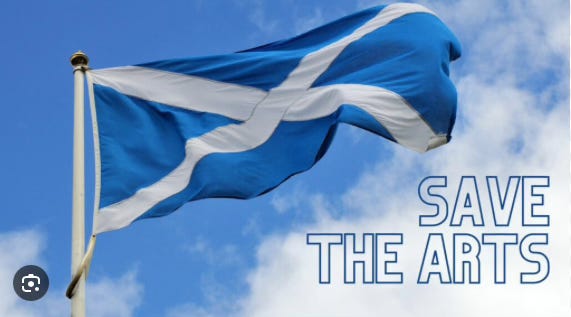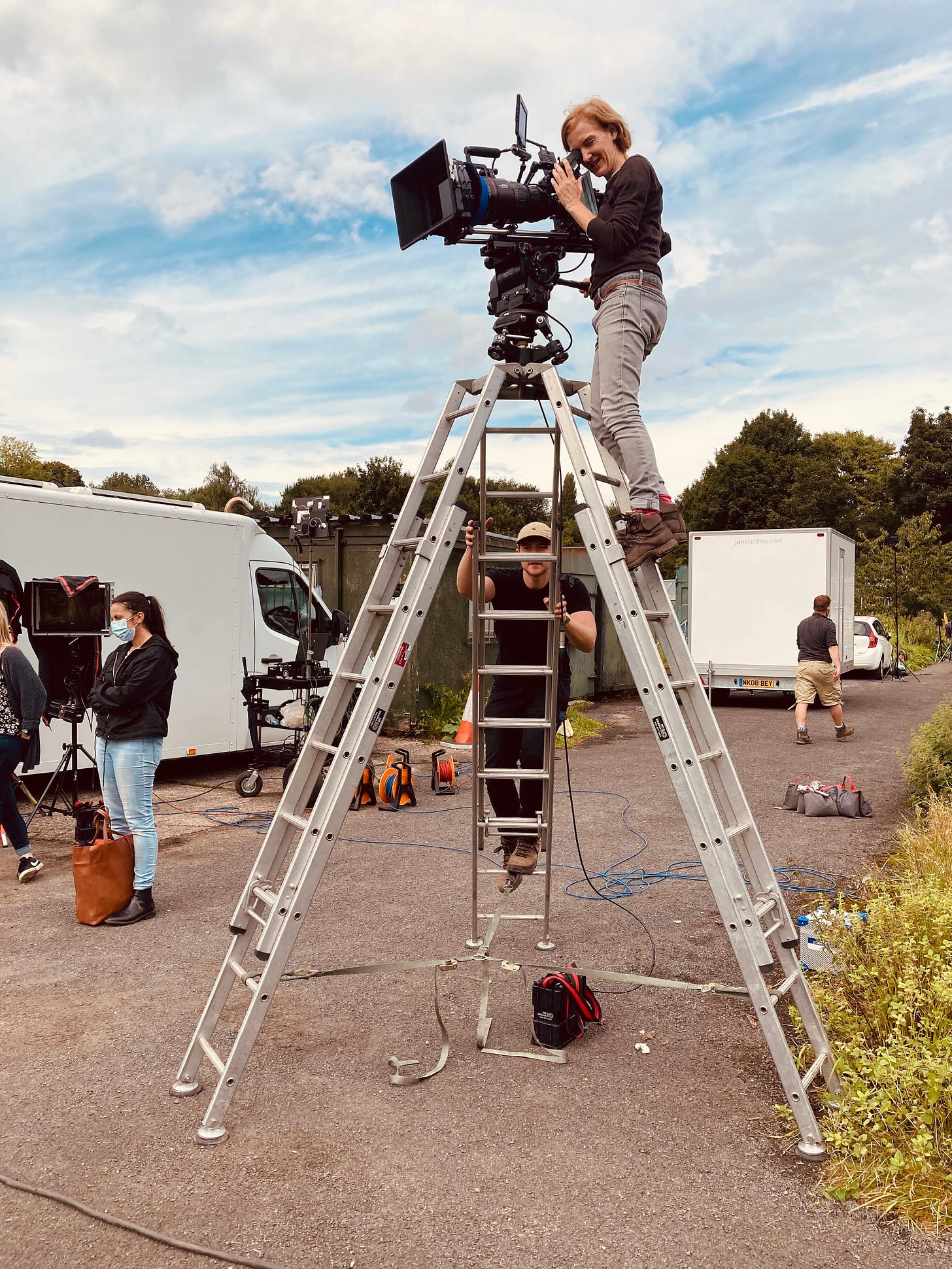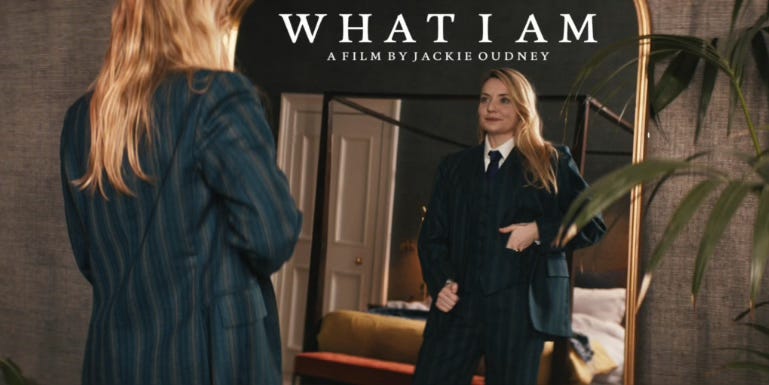The arts are crucial to a nation's identity
But they can only flourish in an independent Scotland
My preamble below was published in The National, September 5th, and in the Edinburgh Evening News, September 9, 2024.
First Minister Swinney’s reversal of his administration’s previously announced cuts to the Creative Scotland Open Fund was welcome news. The creative arts are integral to any nation’s identity, and are especially important to a nation that is a de facto colony of its larger ‘partner’ in this faux union.
The arts in Scotland are seriously underfunded. Just 0.5% of the Scottish administration’s overall spend - £196.6mn - goes towards the arts. Last year the small Nordic nation of Denmark invested £1.84bn in culture, nationally and locally, more than the UK’s £1.57bn Culture Recovery Fund. Denmark, with just 5.9 million people, spends this amount every year.
An independent Scotland unencumbered by devolution’s budgetary straitjacket could match Denmark’s arts funding. It could even pass a Scots Language Act since language is the foundation of any nation’s culture.
One area that is significantly under-funded and developed is the Scottish film industry. Like everything else, London dominates. So, it’s important to recognise and support Scottish talents like Jackie Oudney, an award-winning female film director, whose recent short film, What I Am, is currently showing at 4 international film festivals.
The following article by my daughter, just published by Bella Caledonia, tells Jackie’s story.
The Redemptive Power of Storytelling
Jackie Oudney has been telling stories for as long as she can remember. She is now an award-winning film director, but the road to success has been far from easy.
Speaking to me on Zoom from her Edinburgh home, it quickly became clear that artistic talent runs in the family. At the beginning of our call, my eyes naturally drifted to the colourful paintings that lined the wall behind her.
“My brother painted those,” Jackie told me, tilting her computer screen to reveal a living room filled with his artwork.
Her brother is the artist David Oudney, whose paintings have been displayed in several exhibitions including the Royal Scottish Academy and the Royal College of Art in London.
Jackie, David and their three other siblings were raised in a poor neighbourhood on the east coast of Scotland. Although their parents were creatively gifted, financial hardships and the deeply ingrained belief that they were unworthy prevented them from realising their talents.
Jackie revealed that her mother, who struggled with a gambling addiction throughout her childhood, was a natural storyteller and musician. She often entertained her children with spontaneous bedtime stories and could play any requested tune on the piano, despite having never learned to read music.
Jackie’s father, a watchmaker, was gifted with his hands. He made the majority of his children’s toys himself, either from scratch or by refurbishing used parts - including bicycles.
“He came home one day and said, ‘Jackie, I’ve got a bike for you.’ I ran outside and my heart sank. He had rescued a bike from the bin. It was rusty and the tires were flat.”
Over the following few days, her father disappeared into their garage to spruce up the bike. “It was like Chitty Chitty Bang Bang when Dick Van Dyke disappears into the garage and shuts the doors,” Jackie said, smiling. “Eventually, he brought it out for me and it was all shiny and chrome.”
While David inherited his father’s artistic talent, Jackie inherited her mother’s gift for storytelling.
“As a kid, I was a compulsive storyteller,” she told me. “I think I disappeared into the world of stories as a form of survival.”
As a dyslexic child who grew up with only a small number of books in her house, Jackie escaped into the world of film. In the hours before her parents returned home from work, she frequently staged impromptu plays in her living room.
“I’d get these kids in from the neighbourhood, raid my parents’ wardrobes and give everyone costumes that were far too big for them,” she told me.
By the time Jackie graduated from high school, her desire to tell stories only grew stronger. She spent the first few years of her adulthood working as a retail manager before joining a local drama group. Acting on the advice given to her by her peers, Jackie applied to the Royal Academy of Dramatic Art (RADA) in London to become a stage manager.
To her surprise, she was accepted.
After graduating from RADA, she worked diligently as a camera assistant, which ultimately paved the way for her to direct her first short film, Station. Still struggling with imposter syndrome, Jackie locked herself in the bathroom on her first day on set. “I was so scared,” she said.
While Jackie’s fears may have been irrational (Station was later nominated for a Scottish BAFTA), they were a direct result of her disadvantaged upbringing.
“You grow up with shame and a lack of self-worth,” she explained. “It’s not just the financial barriers. You’ve also got to get over yourself.”
Jackie’s latest short micro-budget film, What I Am, seeks to melt those mental barriers away.
“I wanted to see what a woman from my background would look like unencumbered with all that baggage,” she explained.
What I Am follows a woman named Caroline (played by Christine Bottomley) who loses her memory after falling off a ladder in her opulent home in New Town, Edinburgh.
Disoriented, she hunts her house for clues to uncover her identity. The evidence she finds – beautiful paintings, a large library of books and a wardrobe full of expensive clothes – suggest that she is an intelligent, talented and wealthy woman.
Over the course of the next few days, we see Caroline embrace this assumed identity. She changes into the expensive clothing hanging in her wardrobe. She picks up a paintbrush and confidently strikes it across a nearby canvas. She joyfully dances around the living room at night with a glass of wine in hand.
It’s not long before Caroline learns she is not this erudite, wealthy woman at all, but rather her cleaning lady.
Upon returning home to her comparatively dismal council flat, Caroline despairs at her misfortune. It isn’t until she stumbles upon a stack of her own poetry that she realises her own talent as a writer, and begins to reclaim a sense of worthiness that had previously been denied to her.
“Losing her memory is a device to take away all the things that hold you back,” Jackie explained. “It’s so much more than money and financial freedom. You grow up in an education system that doesn’t value you. You leave school with no sense of entitlement. You don’t think that you deserve anything. If you’re creative, you don’t know what to do with it.”
Although not yet open to the public, What I Am is currently touring the festival circuit. It will be featured at four major film festivals this fall, including the Heart of Gold International Film Festival in Australia, the This Is England Festival in France, the San Jose International Film Festival and the Newport Beach Film Festival in California.
Despite Jackie’s successes, she continues to face significant barriers in her career. Opportunities for female directors are few and far between, especially in a country like Scotland which receives proportionately less in arts funding than the rest of the United Kingdom.
“To be a creative woman in a patriarchal world is difficult enough, but to be a creative woman from a socio-economic disadvantaged background is a lot harder,” Jackie reflected.
As for what’s next?
“I want to tell a story about a woman who is a compulsive gambler,” she said.
Given Jackie’s mother’s own struggles with a gambling addiction, this hits particularly close to home and highlights the one simple truth that runs through all of Jackie’s work: we are the stories we tell.






Excellent thanks. Very interesting. I like watching films via the National Library of Scotland, 'moving image archive' and indeed there are many made by Scotish film makers of days gone by, some women though not many. As an ex artist I have a few things to say re this article, when I have time.
One thing though, I wholly agree about the lack of arts funding and it is so much worse since the pandemic. I found the arts scene far too competetive as it was, before Covid, no doubt Brexit has had a negtive effect too. I know someone who teaches at Leith school of art, says the intake is going down, sadly. Why study art when there are no opportunities post study, not worth it unless you are very well off.
Frantz Fanon wrote that "every culture is first and foremost national". In a colonial society it is never the done thing to promote the culture of the colonized, for that indigenous culture is the basis of the native's national consciousness. Rather, "cultural obliteration" is the aim of the colonizer, who promotes only cultural assimilation. Which explains why culture is an important determinant of independence for an oppressed people:
https://yoursforscotlandcom.wordpress.com/2021/06/27/paper-one-in-the-10-part-baird-series/